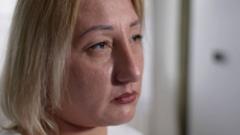In a small flat near Kyiv, Svitlana, 42, anxiously awaited news of her husband, Dima, an army medic captured by Russian forces over two years ago. She never wavered in her loyalty to Ukraine, stating, "My husband would've never forgiven me," despite a chilling phone call from a Russian agent named Dmitry, who offered Dima better treatment in exchange for committing treason against her country.
Dmitry laid out disturbing directives, urging her to sabotage military assets like burning down a military enlistment office or revealing air defense locations vital to Ukraine’s safety. Svitlana recalled the guidelines from the Ukrainian Security Service (SBU) advising families to gather evidence against such approaches by Russian operatives; she diligently recorded their conversations and reported them to authorities.
During an intense series of calls, Dmitry instructed Svitlana on constructing Molotov cocktails and how to avoid detection. He reassured her that cooperation could mean a phone call with her husband or possibly delivering a parcel to him, but the stakes were immense. The moment she voiced her reluctance to comply, threats ensued. "Your husband is being tortured, and it's your fault!" Dmitry warned, deepening her torment.
The SBU urged families approached by Russian agents to immediately report their interactions, clarifying that any betrayal to secure a loved one could lead to severe consequences including life imprisonment for acts of treason. They highlighted the fragility and vulnerability of families of prisoners of war (PoWs), who often face pressure from Russian entities. According to Petro Yatsenko, a representative from the military’s Headquarters for the Treatment of Prisoners of War, about 50% of families of PoWs are contacted as they remain in vulnerable positions.
Russia, on the other hand, refuted allegations of coercion, asserting its treatment of Ukrainian combatants aligns with the Geneva Convention. Instead, they accused Ukraine of similar tactics to compel Russian citizens into sabotage.
Three months after her harrowing ordeal, Svitlana was finally reunited with Dima. Overwhelmed with relief, she described the moment as feeling like she had "snatched [her] love from the jaws of death." Despite the trauma, the couple now cherishes life together with their young son, Vova, reflecting on the immense toll of war on families trying to navigate loyalty and survival under extreme pressure.
Dmitry laid out disturbing directives, urging her to sabotage military assets like burning down a military enlistment office or revealing air defense locations vital to Ukraine’s safety. Svitlana recalled the guidelines from the Ukrainian Security Service (SBU) advising families to gather evidence against such approaches by Russian operatives; she diligently recorded their conversations and reported them to authorities.
During an intense series of calls, Dmitry instructed Svitlana on constructing Molotov cocktails and how to avoid detection. He reassured her that cooperation could mean a phone call with her husband or possibly delivering a parcel to him, but the stakes were immense. The moment she voiced her reluctance to comply, threats ensued. "Your husband is being tortured, and it's your fault!" Dmitry warned, deepening her torment.
The SBU urged families approached by Russian agents to immediately report their interactions, clarifying that any betrayal to secure a loved one could lead to severe consequences including life imprisonment for acts of treason. They highlighted the fragility and vulnerability of families of prisoners of war (PoWs), who often face pressure from Russian entities. According to Petro Yatsenko, a representative from the military’s Headquarters for the Treatment of Prisoners of War, about 50% of families of PoWs are contacted as they remain in vulnerable positions.
Russia, on the other hand, refuted allegations of coercion, asserting its treatment of Ukrainian combatants aligns with the Geneva Convention. Instead, they accused Ukraine of similar tactics to compel Russian citizens into sabotage.
Three months after her harrowing ordeal, Svitlana was finally reunited with Dima. Overwhelmed with relief, she described the moment as feeling like she had "snatched [her] love from the jaws of death." Despite the trauma, the couple now cherishes life together with their young son, Vova, reflecting on the immense toll of war on families trying to navigate loyalty and survival under extreme pressure.


















